Marvel Comics: First Half of 1998, Part 1
In the mid-2000s, I saw my first superhero film, and I saw it on the big screen. I ended up adoring Spider-Man 2, as I still do to this day, and immediately went to the bookstore to find Spider-Man comics to read. Marvel was publishing the Essential series at the time, a series of black-and-white collections of the original 1960s books. I devoured every volume I could find, drinking in the soap opera and the rich world and the interesting characters. Occasionally, characters from elsewhere in the Marvel Universe would cameo, like Human Torch or Hulk or Thor, and I would wonder what was going on in their comics.
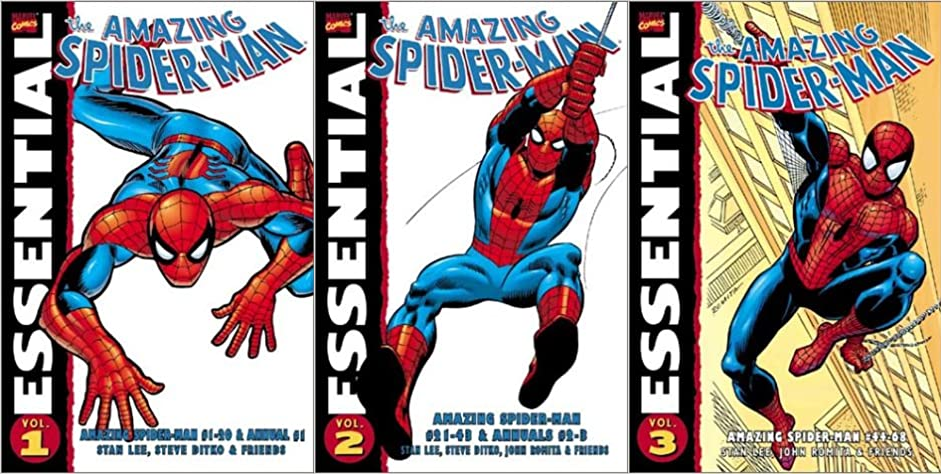
In 2006, rather than going to a bookstore for the latest Essential volume, I walked into my local comic book store. There, I spotted the latest issue of Amazing Spider-Man on the shelf. The bottom half of the cover was a deep solid red, and other comics in the store had a similar design. I picked up the issue, along with an issue of Wolverine, and an event comic that seemed to tie the two together: Civil War #1.
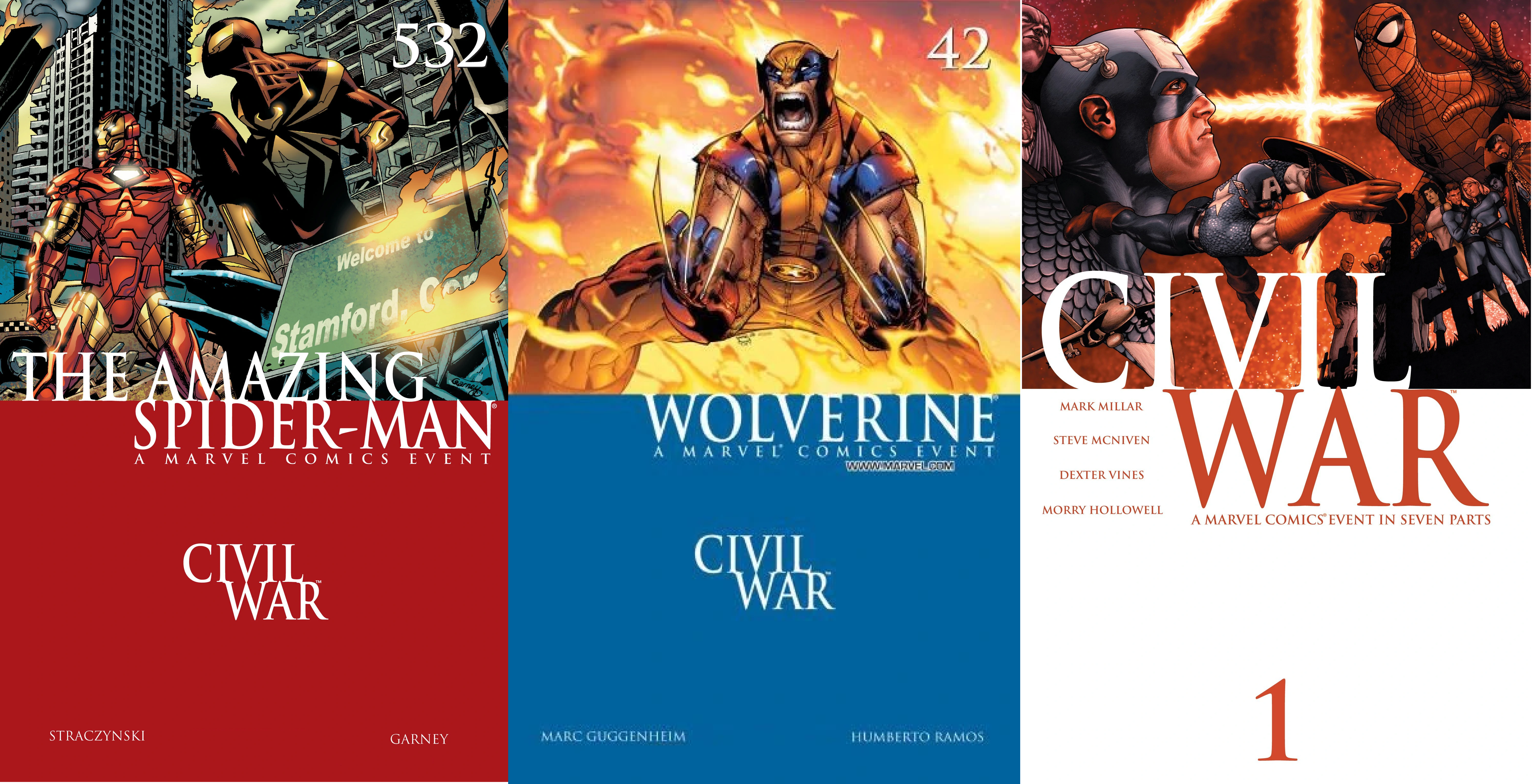
The way superhero comics are written has evolved a lot over time, but especially over the last twenty years. As comics sales have struggled, Marvel and DC have thrown more and more ideas at the wall, never sticking with any one idea for very long. It's led to a more diverse stable of characters and some truly gripping long-form narratives, and it's even bled over into other forms of media, particularly blockbuster cinema.
So, because I'm a sucker for superheroes generally and Marvel specifically, I thought it'd be interesting to read the last twenty years of Marvel Comics and witness that evolution. It'd give me an excuse to read some of the all-time great comics runs along the way: Grant Morrison's X-Men, J. Michael Straczynski's Spider-Man, and Brian K. Vaughan's Runaways, just to name a few.
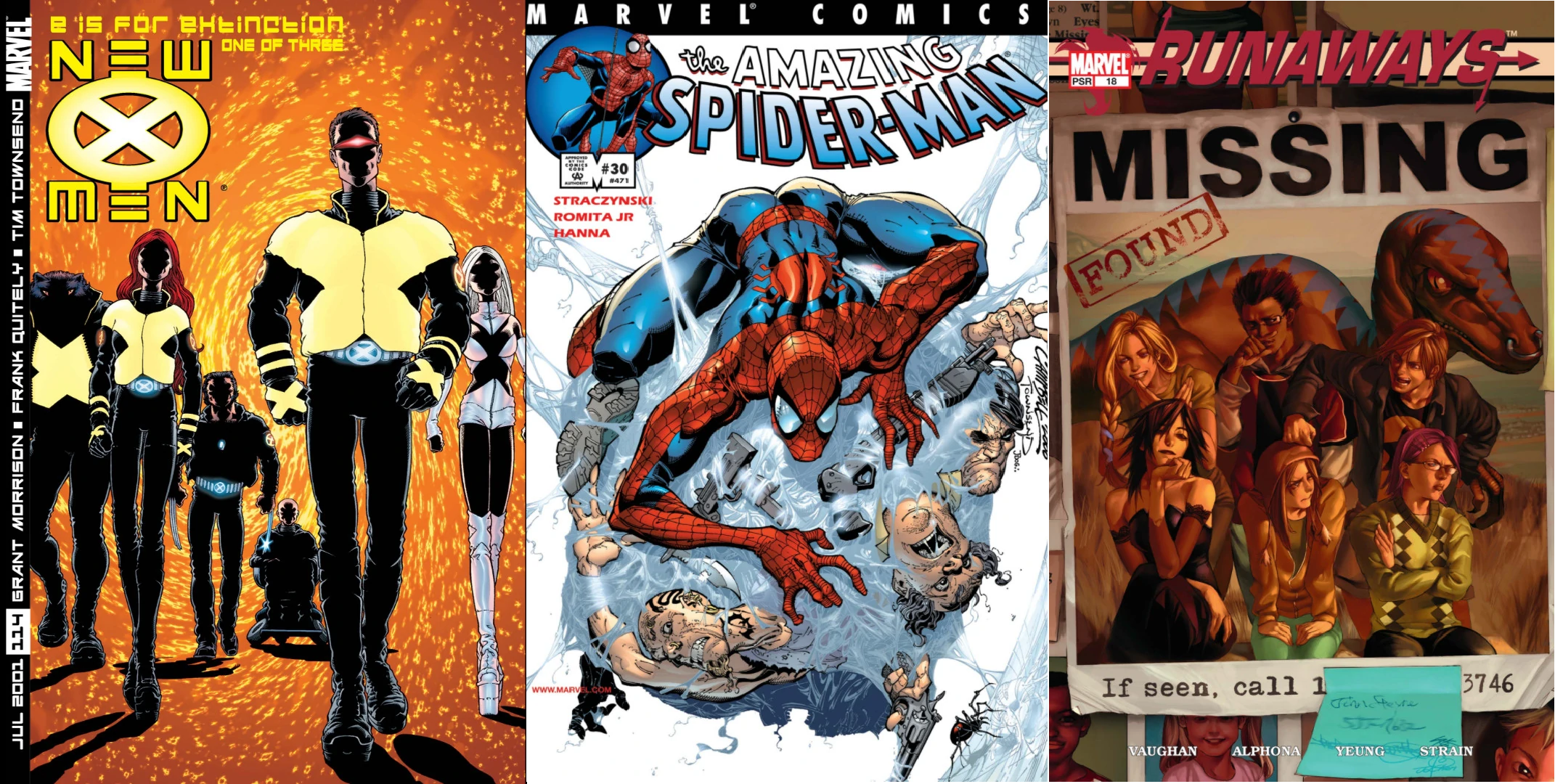
It's a massive and probably ill-advised undertaking, but since when has that ever stopped me? I'm the one who tried to read all of Aristotle's philosophy and got stalled partway through Nicomachean Ethics.
Where to Start
This is going to be a long journey, but it wasn't originally going to be as long as it now turns out it will be. Let me explain.
I knew I wanted to start reading *around* the time that Brian Michael Bendis took over the Avengers in the mid-2000s. I know that a number of other big runs started around then, and it was pretty close to my original jumping-on point, too.
But there's a few notable runs that start significantly before that, including the three I listed above (Morrison's X-Men, JMS' Spider-Man, and BKV's Runaways). And there's also Ultimate Marvel, an extremely influential line of comics which launched in 2000 and ran for about a solid decade and a half.
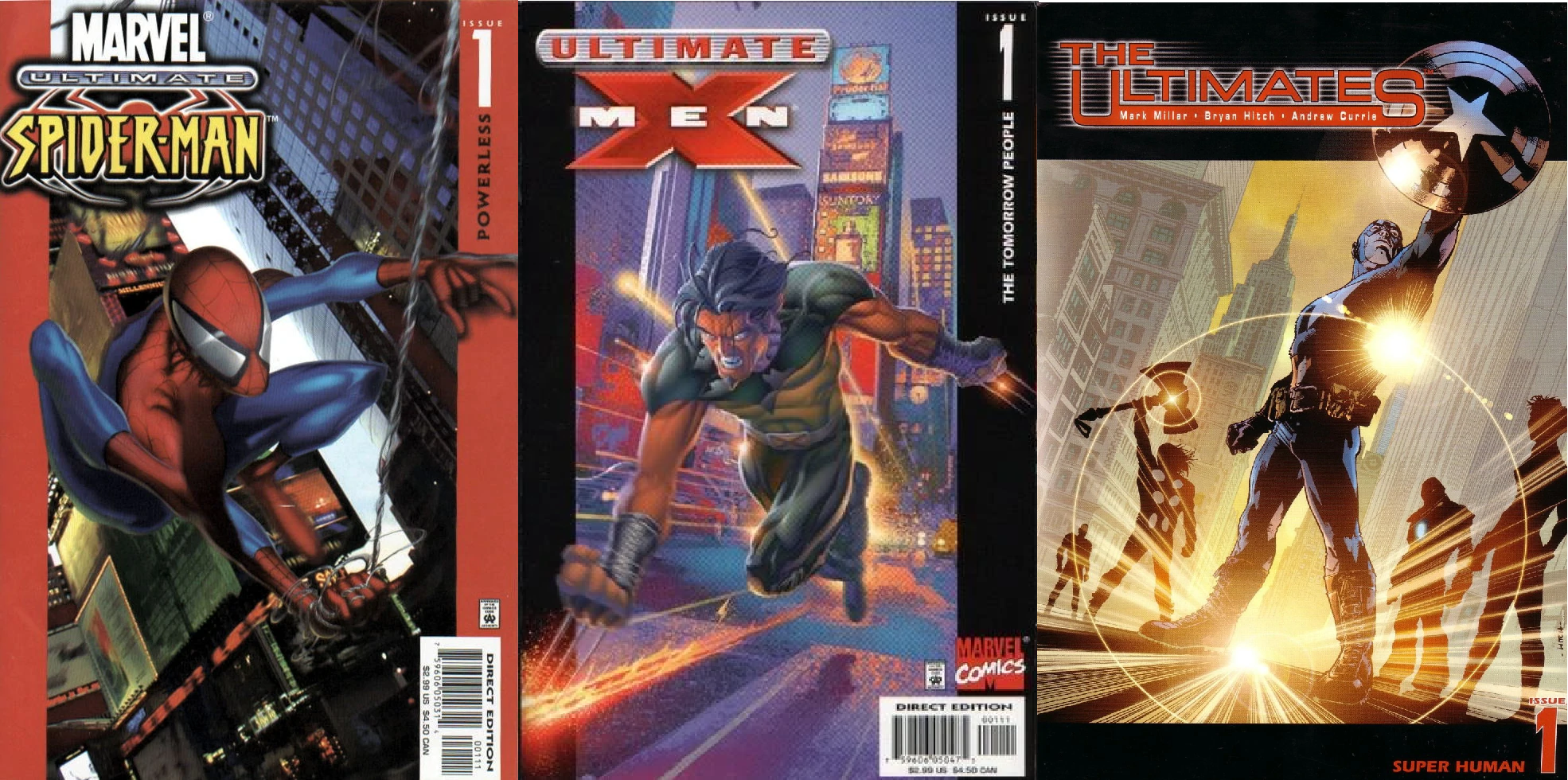
So maybe Ultimate Marvel was where I should start looking. Well, I looked at the line-up in late 2000, and noticed that several notable comics were not too far into their run -- notably, the Marvel Knights line, which included reboots of Black Panther and Daredevil, among others. Those comics also have a lot of legacy associated with them. I backed up again.
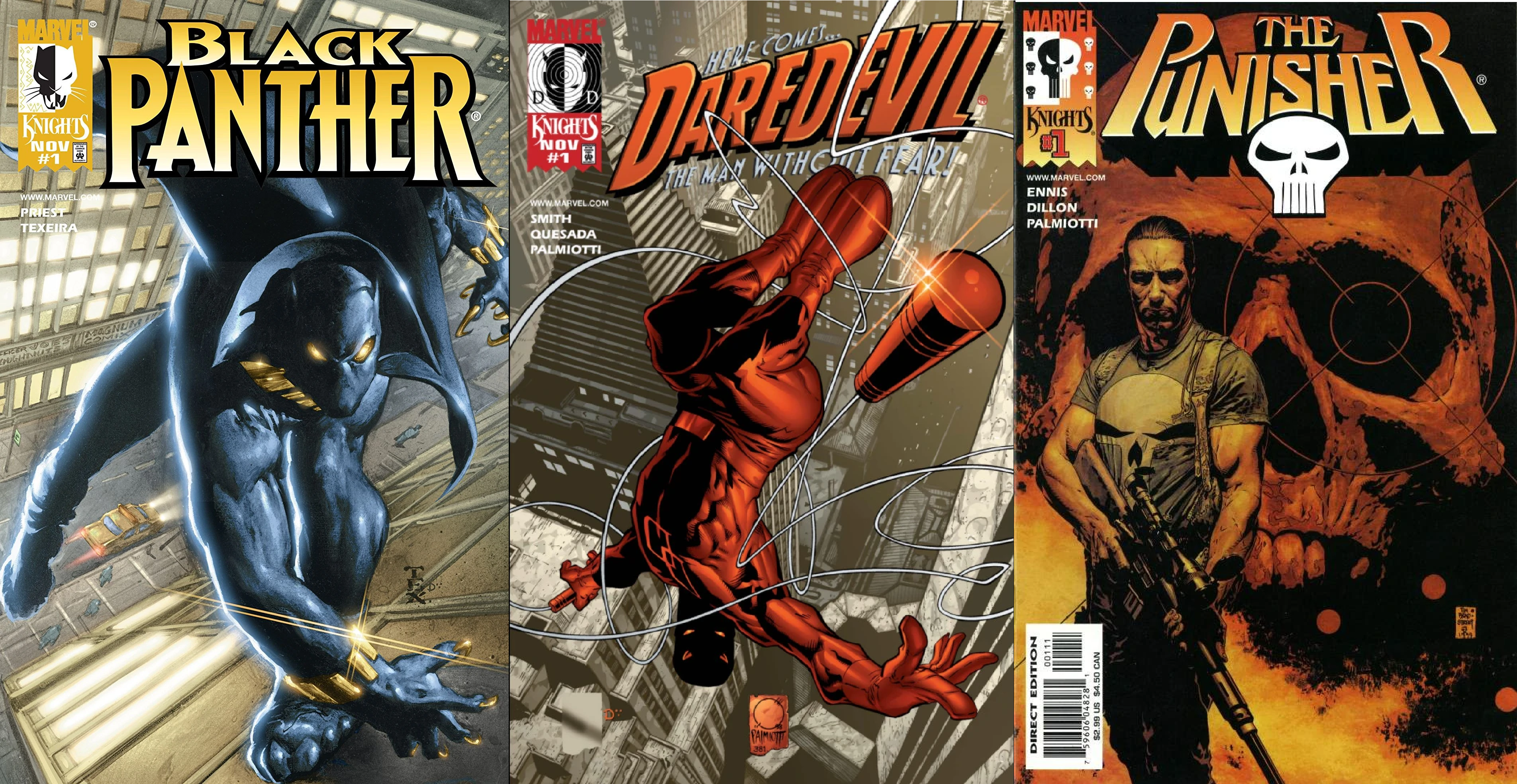
Turns out the Marvel Knights line started in 1998. Maybe 1998 should be my new starting point, I thought. But *then* I noticed that lots of the main Marvel titles, such as Fantastic Four and Avengers, had been very recently rebooted at that time. In fact, nearly every major Marvel property, except for the X-Men, received a reboot around 1998.
One more time I moved backwards on the timeline, and this time I found my starting point. In 1996, the supervillain Onslaught attacked the Marvel Universe, and several prominent superheroes seemed to sacrifice their lives to stop him. In reality, they ended up in a pocket universe, where their lives began anew, with new origins and backstories. Marvel outsourced this work to the house of Jim Lee and Rob Liefeld, and called the new reboot event "Heroes Reborn."
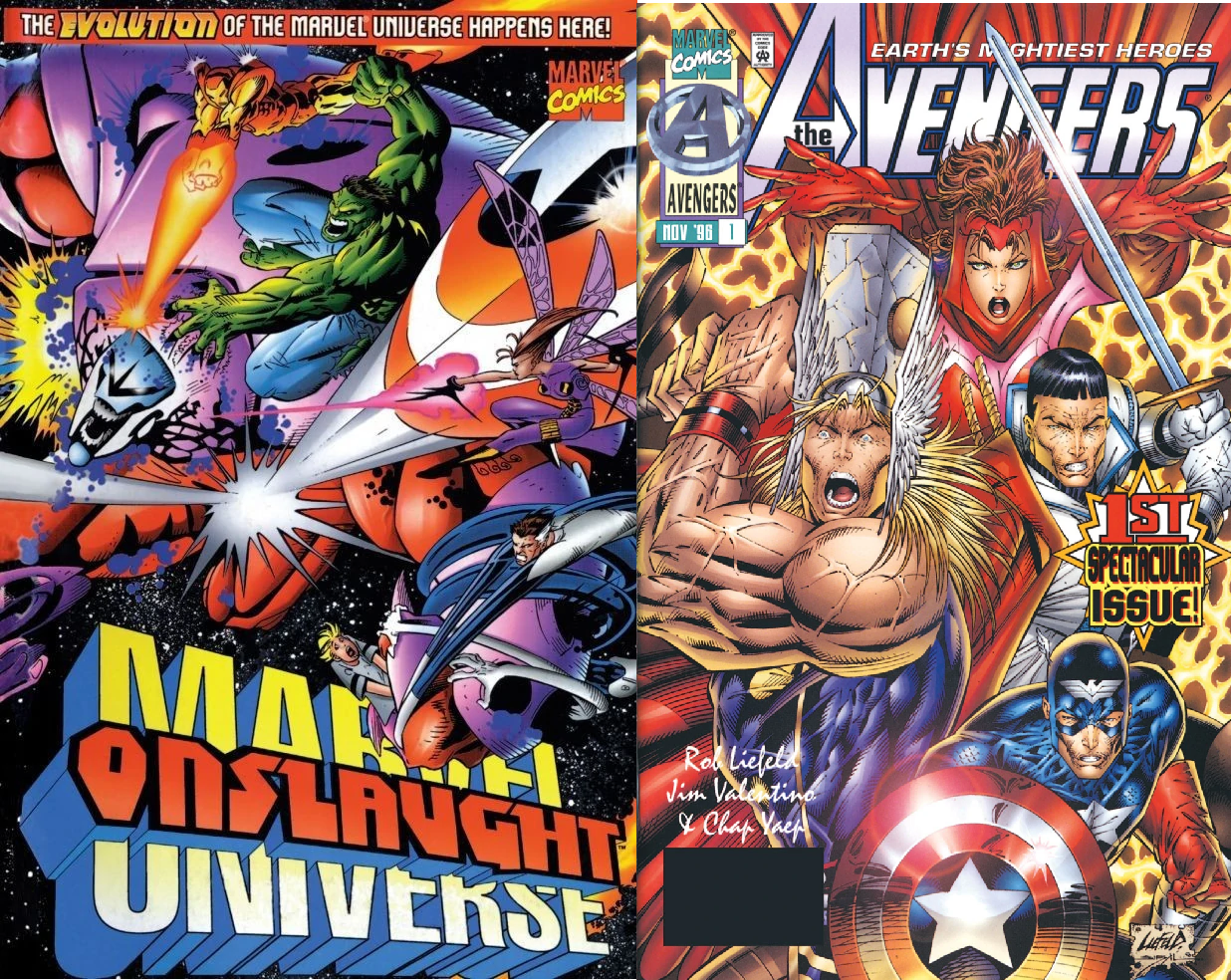
This did not go over well with fans. So in 1997, Marvel brought all those heroes back to the main universe and rebooted all those titles *again* with the redundantly-named event "Heroes Return." It's a new beginning with new creators on many titles, and an attempt to recapture some of what made classic Marvel Comics good. This relaunch seemed to be a solid starting point for my project.
A few very notable, very long-running titles also began around that time: the wise-cracking Deadpool and villains-turned-heroes Thunderbolts both launched around that time. So I started with those, along with the Heroes Return comics, and decided I'd pick up new series as they hit. Before too long, I'd picked up nearly every issue that got published in 1998, and went back a few months to pick up context, too.
(I got lucky with the X-Men. Even though they were not officially a part of Onslaught or Heroes Reborn/Return, they went thru an event of their own called Operation Zero Tolerance in 1997, so I began reading in that event's immediate aftermath.)
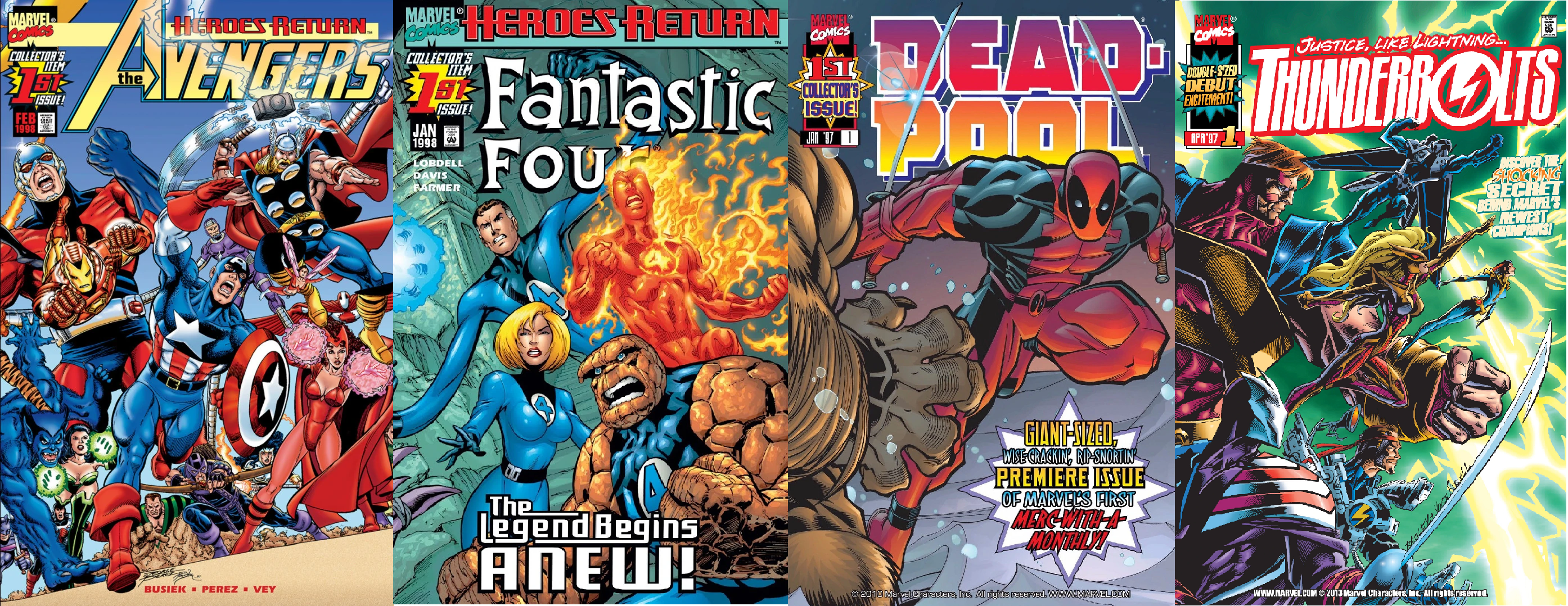
So this is my starting point. 1998, with twenty years to go until I catch up. There's a few issues from 1998 I didn't read: I skipped reprints, and I skipped Marvel's Star Trek comics, which were cancelled very early in 1998 anyway.
The plan is, every six to twelve months of reading, I'll write up a new analysis. See where Marvel's at, what's changed, how things are going. This first analysis will be a bit longer as it also has to cover some issues from 1997 that gave me context.
Overall Impressions, Before We Begin
There's a very classic feel to many of these comics. Some of this is probably Marvel trying to recover from the intense tone of their mid 90s comics in general, and of the Onslaught and Heroes Reborn events in particular. But there's a few 90s-style badass grim action types still around in books like X-Force, Cable, Maverick, and Wolverine.
I've looked at the titles listed for January of 1999 for reference, and nearly all of Marvel's long-running titles are cancelled or rebooted in 1998, except for a few notable X-books. (Uncanny & adjectiveless X-Men, X-Force, Generation X, Cable, Wolverine, and X-Man survive in the near future.) As far as I can tell, this is the closest Marvel's ever come to wiping the board clean and starting with all new #1 issues, at least until the repeated Marvel Now reboots of the 2010s.
There's some really good writing in here. Now I know why people like Kurt Busiek and J.M. DeMatteis are considered all-time greats - but I'll get to that later.
Alpha Flight vol 2 #1-13
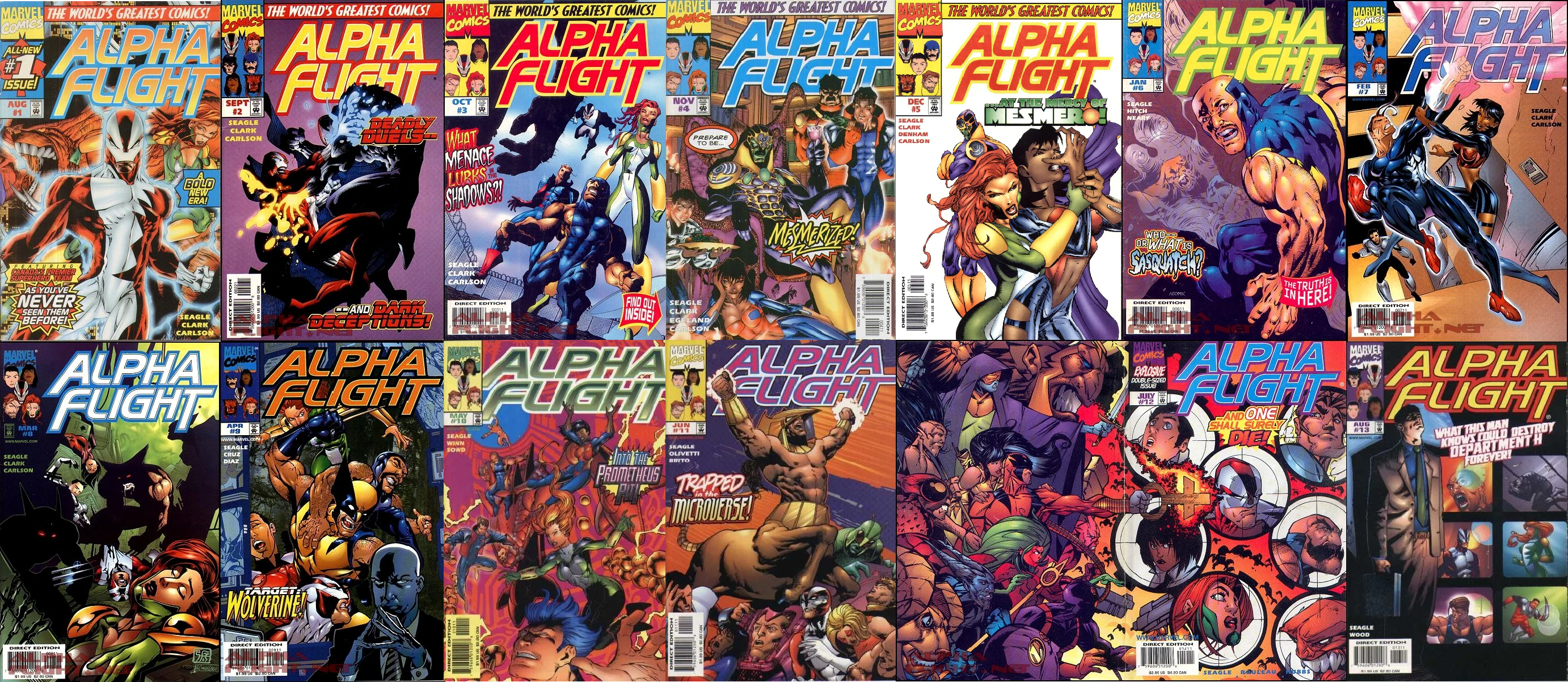
I was going to skip Alpha Flight, but they kept popping up in other series, so I finally picked it up. The core conceit is that Canada's premiere super-team is being manipulated by a corrupt government agency. The pacing is weird - I think it takes a little too long for the heroes to realize that their memories have been manipulated. A dozen issues in, and they're just now starting to shake off the effects.
Much like some other series I've read that don't seem to trust they'll survive past a year (Thunderbolts, Ka-Zar), Alpha Flight reaches a big climax at issue 12. It has an official crossover with Uncanny X-Men at one point, but otherwise is surprisingly self-contained given how much it was advertised elsewhere.
The highlight of these is certainly issue 13, an experimental issue which follows a government lackey instead of any of the main (and pretty forgettable) heroes. Otherwise, I think writer Steve Seagle limits the book, as he does over in Uncanny X-Men. He's just not evocative in his writing or rich in his characters. He's going for a classic superhero style, but in a way that's kinda drab and boring. I'm hoping the book turns around in its final half-year, but I'm not really expecting it to.
Amazing Spider-Man #432-437

In 1998, Bob Harras was the Editor-in-Chief at Marvel Comics. (He would go on to become the EIC at DC Comics in the 2010s.) He wanted a Spider-Man event that would rival X-Men's Age of Apocalypse, a mid-90s event that temporarily completely changed the status quo, down to ending all of the main X-books for a couple of months and replacing them with alternate universe equivalents. Harras' brainchild for the Spider-Man comics, "The Clone Saga," ended up being overlong and detested by fans. You could understand why I was perhaps a little hesitant to pick up the series involving one of my all-time favorite superheroes.
But Spider-Man in 1998 is, lo and behold, somehow quite good. There's four series running at the time: Amazing from the 60s, Spectacular from the 70s, adjectiveless Spider-Man from the early 90s, and Sensational from the late 90s. The books are so tightly edited that at times it feels less like reading four monthly Spider-Man titles and more like reading one weekly Spider-Man series, especially whenever they all cross over for a big event.
This stretch of issues has two events. The first is Spider-Hunt, which follows Spider-Man as he flees mercenaries and tries to rescue Norman Osborn's son. It's a good example of how tightly edited these books are; Spider-Hunt reads like one four-part story across issues from four different series.
The second event is Identity Crisis, which I think is not only the stronger of the two events, but also one of the better-conceived events I've ever read in a Spider-Man series. The concept is that Spider-Man, still on the run, has decided to adopt a new persona so he can keep fighting crime while staying safe. Peter has understandably come to the conclusion that Spider-Man disappearing at the same time a new hero appears would clue people in to what's going on, so he adopts *four* new identities all at once, two heroic and two... less so. This lets the writers of each series have a little more creative leeway, since each gets to write the adventures of only *one* of the four new personas. It's a strong concept, and the writers all seemed to have a lot of fun with it.
That brings us to the '98 writer of Amazing, Tom DeFalco. He's a fill-in writer in a lot of other places this month, and he's written about half the What If issues I've read, but this is his main book. For the longest-running Spider-Man book of all time, he's a solid choice. DeFalco has a very traditional style, from his dialogue to his plotting. I think Amazing takes the fewest risks of the four Spider-titles - the villainous character DeFalco's obsessed with, Black Tarantula, is really nothing to write home about - but it's also not the worst of them, and occasionally has a really stand-out issue, such as when Spidey uses all four of his new identities at once to fight supervillains. I particularly enjoyed the crossover with Generation X where Peter turned into a monstrous half-spider, but I'm kind of a sucker for weird shapeshifting stuff.
Amazing Spider-Man & Devil Dinosaur Annual 1998
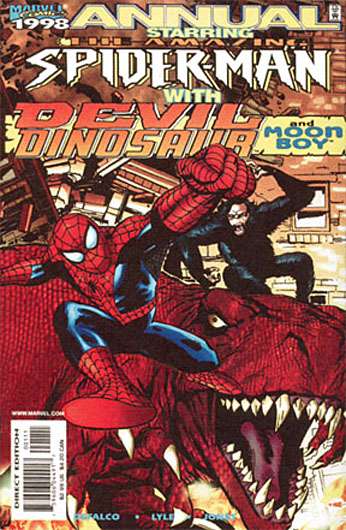
Marvel's gimmick for 1998 annuals is that every single one is a two-character crossover. It's a pretty good idea - if you don't care about one character, you might care about the other - and as far as I can tell, this is the only time in history that Marvel has ever done this. Devil Dinosaur & Moon Boy aren't all that interesting, and the Circus of Crime is never really a formidable enemy, but the issue's okay. I look forward to Devil Dinosaur getting his female companion in the 2010s.
Avengers vol 3 #1-7

I don't know at what point Avengers became Marvel's showcase blockbuster crossover comic. Maybe to some degree it always was; what with all the B-tier characters coming together, its inherent crossover nature is a bit of a distillation of some of the core of what Marvel Comics is all about: many heroes in a single unified universe.
Anyway, Kurt Busiek takes that idea and runs with it, and just damn this is a beautiful bombast of a thing. Busiek's Avengers is considered one of the all-time great runs; now I know why. It starts with a classic lineup - Iron Man, Captain America, Thor, Hawkeye, Scarlet Witch, Vision, Carol Danvers, and two New Warriors. It's absolute bloody chaos - within the first issue, the Avengers lose a fight that causes all of reality to shift to a medieval fantasy for a couple issues. I give George Perez and the art team a lot of credit for taking complicated setups and making it all look cohesive and bold. This was easily one of the most *fun* series to read in this whole thing.
Now: Busiek is also writing Thunderbolts, and I'll get to that one, but here's a tease: Thunderbolts has some of my favorite writing in this whole project. Its characters are freaking incredible - and the character writing in Avengers is just not quite up to that level. Given how iconic these Avengers are, and how Busiek was able to pretty much create the Thunderbolts himself, it's clear to see why. This isn't a character-driven comic, it's a blockbuster action film. And that's fine.
When the book does go for character drama, it stumbles. Busiek's a core orchestrator of the first big crossover of 1998, "Live Kree Or Die," which tells a four-part story across four series: Iron Man, Captain America, Avengers, and (of all things) Quicksilver. The core of that story is the Avengers trying and failing to stage an intervention for Carol Danvers, who's lost some of her superpowers and has resorted to alcohol. It's a messy story that's super disappointing given how great of a character Carol will be in the mid 2010s, when she becomes the new Captain Marvel.
Avengers & Squadron Supreme Annual 1998
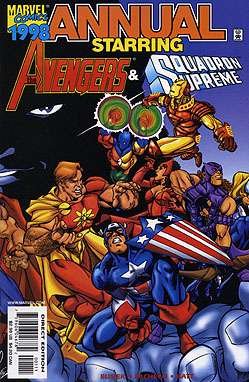
One of the early Avengers storylines involves them battling Squadron Supreme, a superteam I didn't find to be all that remarkable. The Avengers find the Squadron kind of annoying because the Squadron is being mind-controlled for the umpteenth time, and I couldn't help agreeing with them. This annual finishes off the Squadron's storyline with the Avengers, and sends the Squadron back to their own universe, where they'll finish their story in a one-shot later this year. It's a decently satisfying conclusion that's been oddly shunted out of the main series, but frankly freeing up time to deal with other more interesting foes in the main series is something I'm fine with.
Cable #48-57
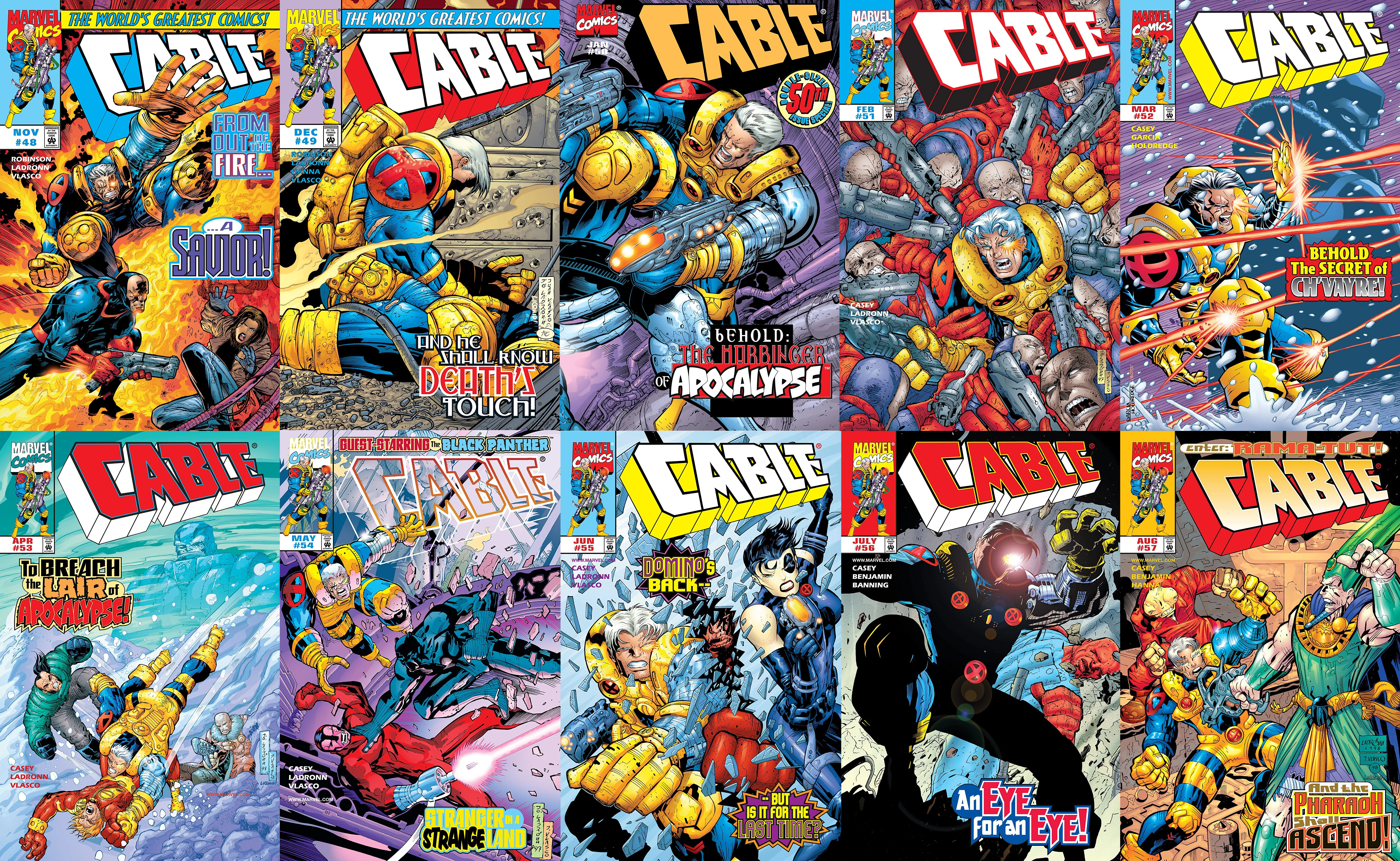
Of the three X-Men solo books starring grim and gritty dudes, Cable has the strongest reason to exist: Cable's from the future and trying to stop shit going down that'll cause disaster in his home time. This doesn't play a major plot role in every single issue, but it is kinda always in the background and definitely gets mentioned every month, which gives you a little more of a hook to keep coming back - what's gonna happen, is he gonna fix everything?
The six-parter I started out with, The Hellfire Hunt, is the strongest writing in the book that I've seen yet, and also the most relevant to that core plot. Since then the comic has generally leaned on guest characters like Domino and Ulysses Klaw, but it's still been reasonably entertaining, and I'm someone who can get tired of the Grim Superhero Guy genre *real* fast. Especially a guy like Cable, relic of the 90s grimfest that was Marvel Comics, who looks like he has an entire kitchen pantry glued to his outfit.
Cable & Machine Man Annual 1998
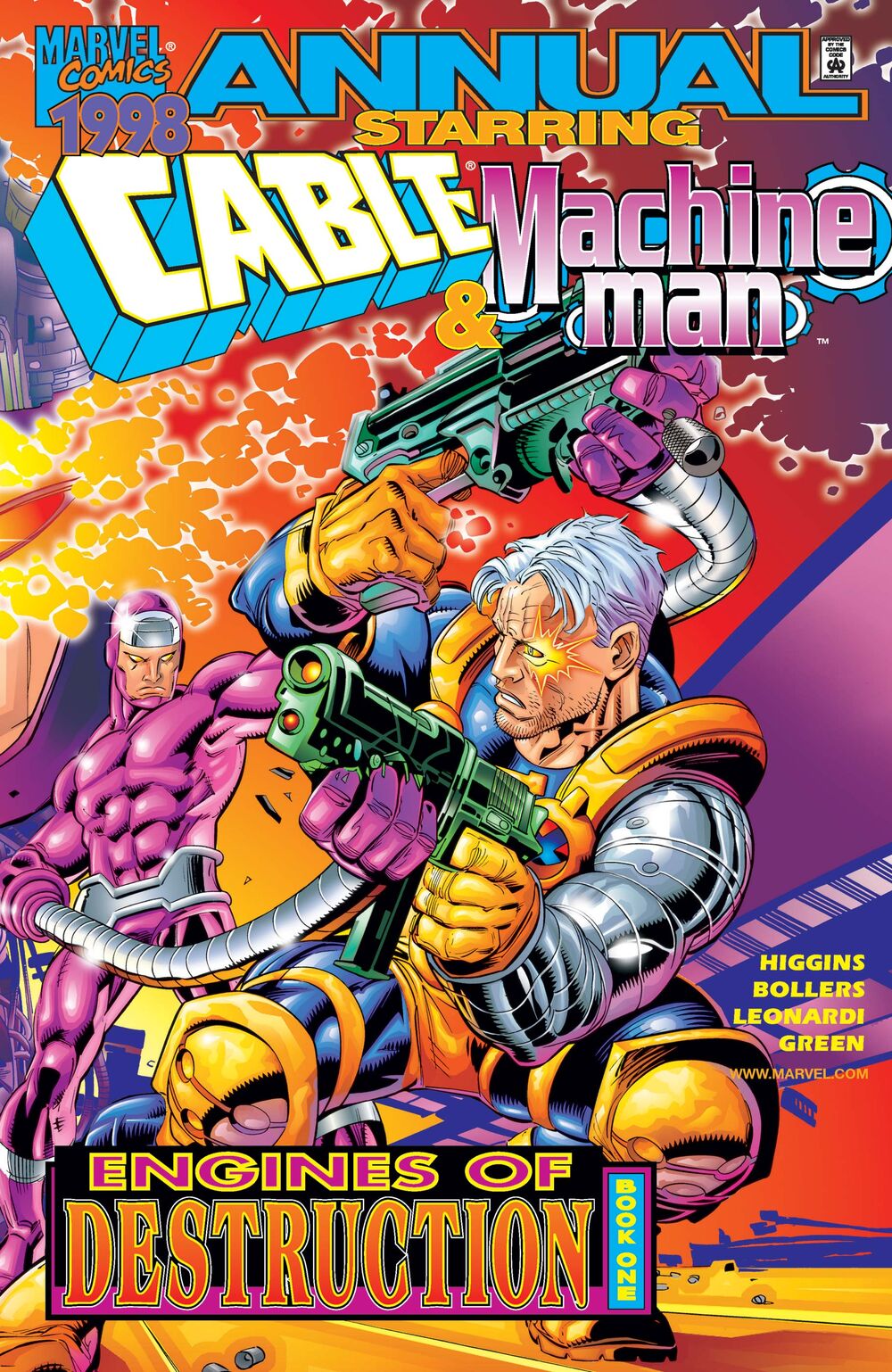
This is really the only Cable issue I've read that touches on the post-Onslaught event most of the X-books went thru, "Operation Zero Tolerance." Cable faces the villain of that event (Bastion) and also a brainwashed Machine Man. It's extremely basic.
Captain America vol 3 #1-8
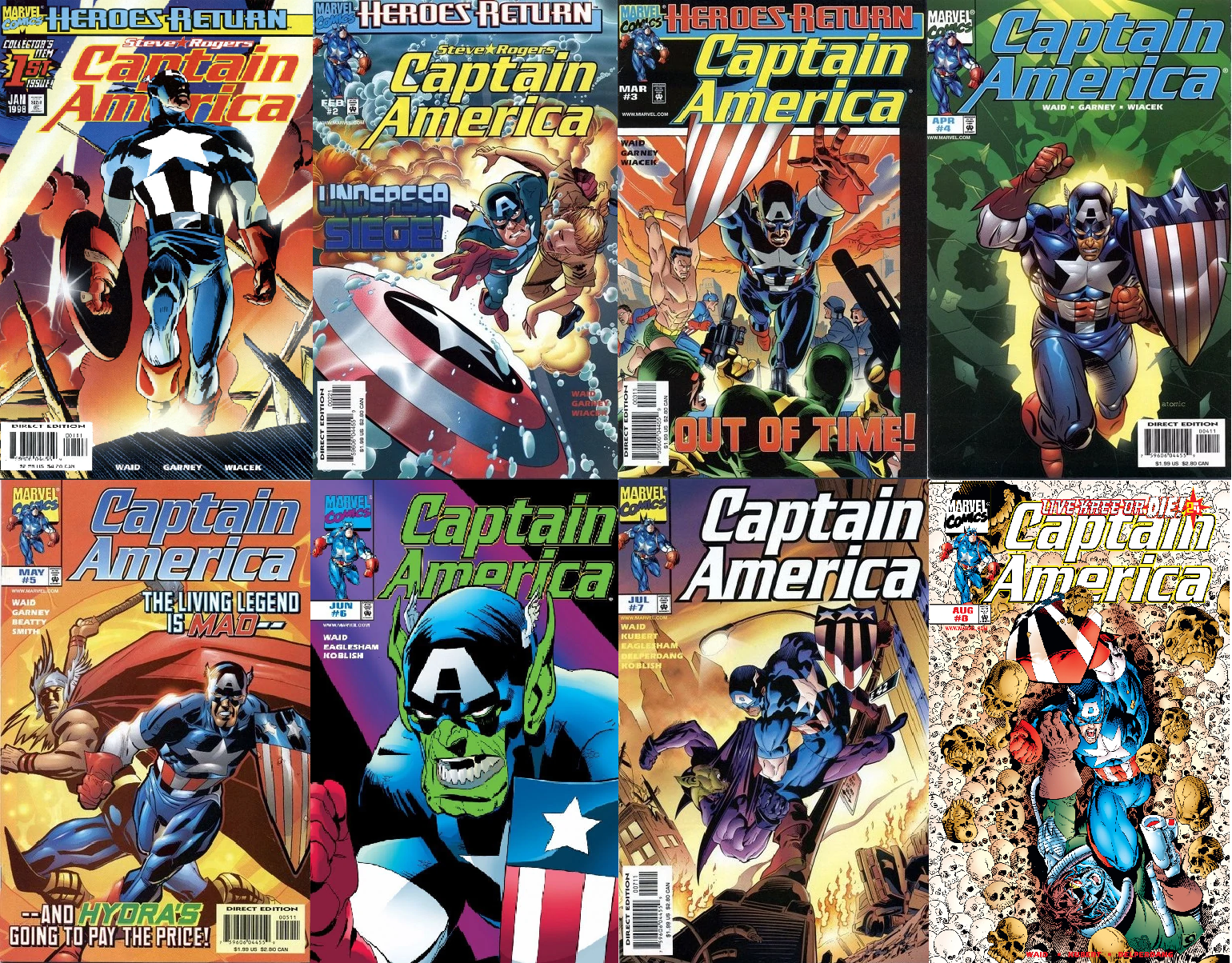
Mark Waid's a super solid writer, and has stuck with Marvel all the way thru 2019. Volume 3 is actually the second part of his run on Captain America, but it's a fine jumping-on point.
The overall Big Question that Waid's run grapples with is, what are the ramifications of being worshipped as a hero? (X-Man is dealing with this question in his own comic, too.) It runs through the whole series right up to the three-part climactic "Power & Glory" storyline, in which an alien Skrull impersonates Captain America and uses the trust people have in Cap to announce a Skrull invasion that hasn't actually happened, thus spreading paranoia and fear. I don't think the comic handles it all that well - mostly, Steve mopes for a while, but otherwise he doesn't really do anything he wouldn't have done otherwise.
On the other hand, some of the things this series does are really fun. Waid's great at setpieces, like when Cap has to escort two kids thru a museum, or when Cap fights Hydra on a boat and loses his shield. Waid's also not afraid to handicap Steve to raise the stakes. I've had fun with this title.
Daredevil #373-378

Daredevil is one of those characters who can get so far into dark noir tone territory that I can barely tell what's going on. And indeed that is the case for the first two or three issues, co-written by Joe Kelly. Kelly has a bit of a mixed reputation with me so far in this project - his Deadpool is all over the place, but his X-Men is some of my favorite comics of 1998.
Once other writers come into play, Daredevil gets much better. Chris Claremont helps write the finale to the storyline where Karen Page is under investigation, so the issue when the trial takes place is really solid, even with a supernatural enemy mucking up proceedings.
Then Scott Lobdell of all people comes in to write a four-parter called Flying Blind, and this is some of the best Lobdell I've ever seen. The premise is that Daredevil's had his memories rewritten for a covert SHIELD mission, and the one SHIELD agent looking out for him and directing him is killed by mistake. It's up to Daredevil to figure out who he is and how to get home with no memories or outside help. That's a solid hook! And the drama is really good, with Matt's friends at home trying to find him, and Matt's villains recognizing him long before he's figured out why they know him.
Daredevil vol 2 #1/2
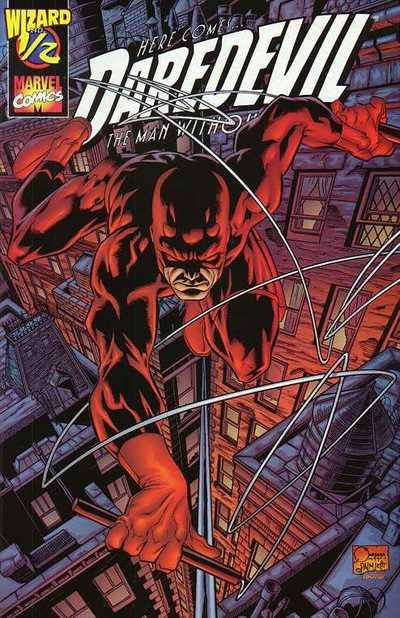
This is just Kingpin telling Mysterio about Daredevil's past in a prose issue that's meant to set up the soon-to-be-launched new volume of Daredevil. It's fine, albeit a bit of a perplexing release.
Deadpool #1-19
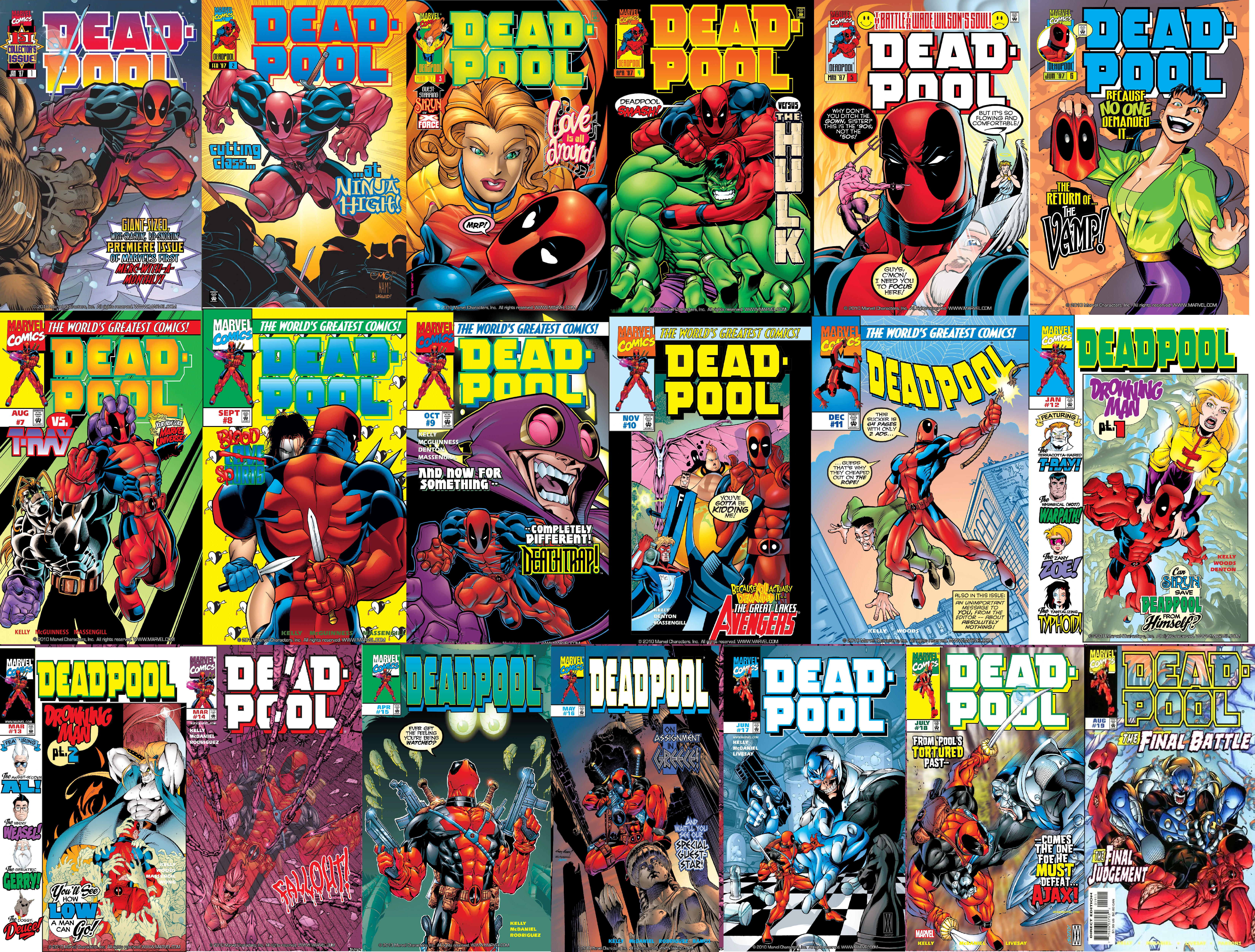
Deadpool had a couple of limited series before this outing, "The Circle Chase" and "Sins of the Past." Both hit in the mid-90s and both were part of the dark edgy violent 90s crowd. The Deadpool that 2020 audiences know and love - always wise-cracking, and frequently breaking the fourth wall - first got codified in this, his first ongoing series.
Over the years, the best Deadpool stories I've encountered have used Deadpool's jokiness as a front for some really tough questions about heroism in the face of trauma, and about Deadpool's very identity. Joe Kelly starts to get into some of that here, but it hasn't yet been refined. In one storyline, Deadpool stages a prison break for Typhoid Mary, a woman with multiple personalities. She proceeds to test his heroism by killing people, to see if he'll unheroically take her down to stop her. In the process, Deadpool's ideas of himself as a hero break down because he doesn't know the right thing to do - he doesn't want to hurt Mary who's obviously suffering, but his hesitation causes other people to die.
Deadpool only has stories like that every so often at this point, though. The biggest flaw I find with this series so far is how much of a chore it can be to read. Deadpool's a very wordy character, and a lot of the jokes don't land. I also don't like the story's treatment of Blind Al. She's a blind old lady who serves as Deadpool's companion, and early in the series it's unclear if she's his prisoner, or if she's just hanging around cause Deadpool's not actually all that menacing to her and cause she has nothing better to do. Later in the series, though, he tortures her by placing her in solitary confinement, and when she gets out her first reaction is to... try to change him for the better. Rather than fleeing Deadpool and his abusive treatment, she stays because she cares about him too much. This sucks.
Deadpool & Death Annual 1998
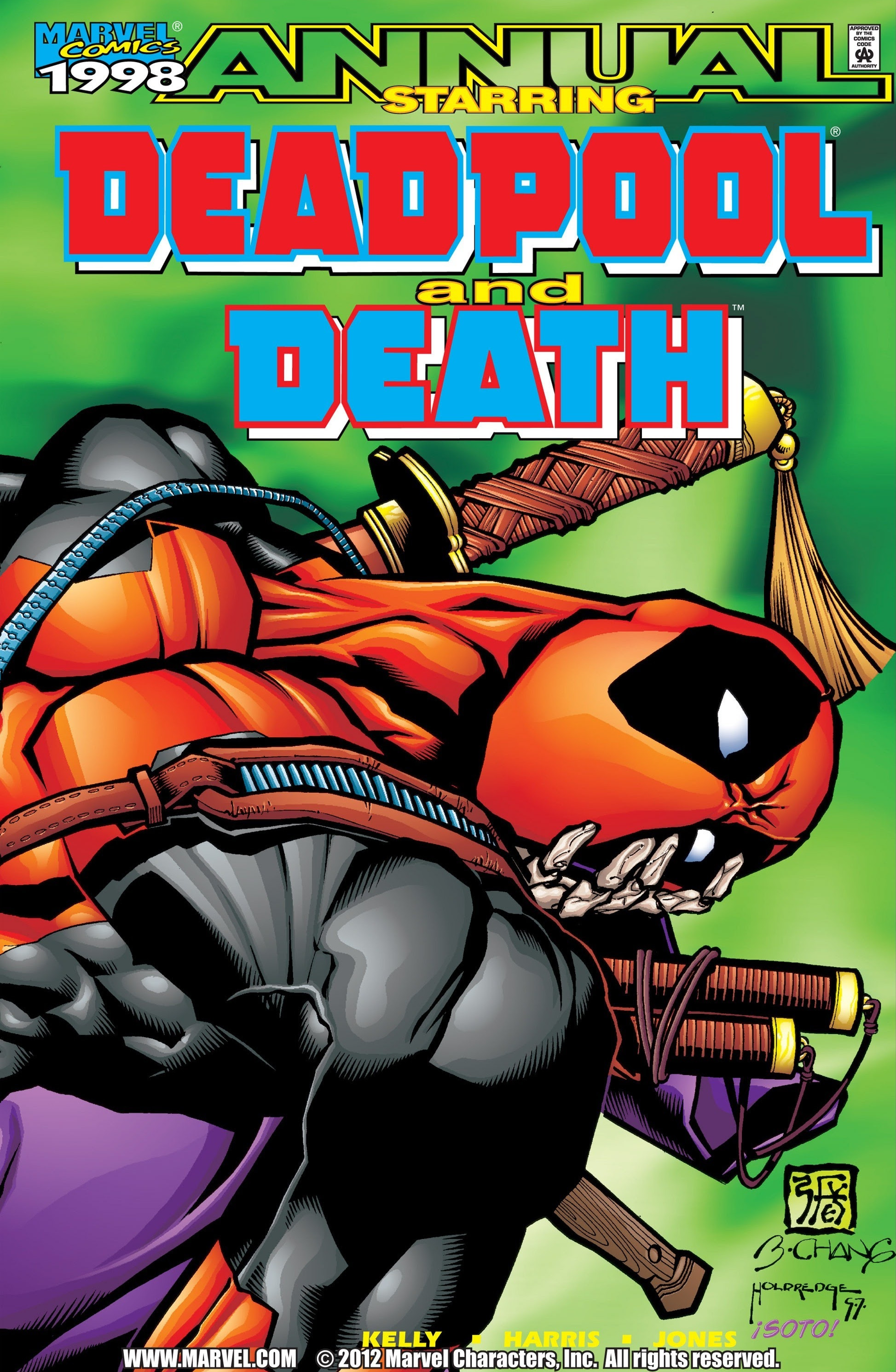
This issue combines the prologue to a multi-parter in the main series with a retelling of Deadpool's origins. It's pretty useful considering I never read the original two limited series and have no interest in doing so.
Elektra #1-19
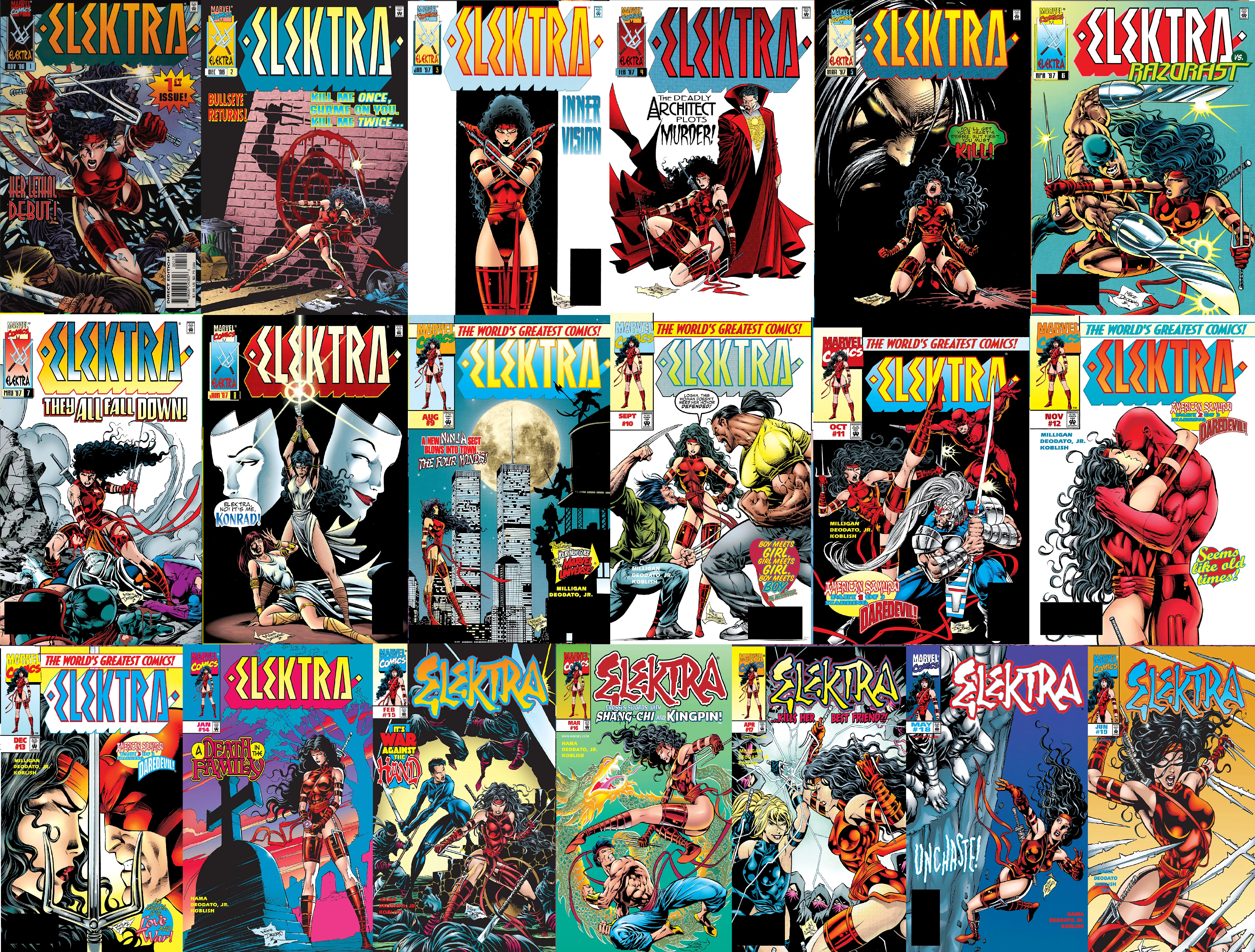
Elektra is the worst comic I've read in this project so far. For a long time, that dubious honor went to X-Man, and I'll get to why later. But then I struggled thru this series of issues and X-Man lost its crown.
Everything about this series is absurdly gross and sexist as fuck. The dialogue leers at Elektra's features like a horny twelve-year-old. The plot sees men taking advantage of Elektra over and over, both villain and hero alike. (Daredevil is her lover for an entire two issues before dumping her.) The art puts her in impossible poses constantly so her boobs and butt are always on display. The stories are boring and unoriginal, the guest characters are often written completely out of character, and Elektra herself is pretty unlikeable. She deserves better.
There's a couple of side characters that I did end up growing to like. Elektra has a dance instructor towards the beginning of the series, who starts out pretty unlikeable, but then a villain's scheme ends up permanently swapping him into the body of a young woman. I liked seeing him come to grips with that. And Elektra has a young ward named Nina who is briefly brainwashed by the Hand ninjas before she and Elektra save each other. Unfortunately, the series ends on a huge cliffhanger, with Nina having turned evil again, and the world on the hunt for Elektra. As far as I can tell, that cliffhanger won't be resolved anytime soon. Good riddance. Elektra, and Marvel, deserve better than this.